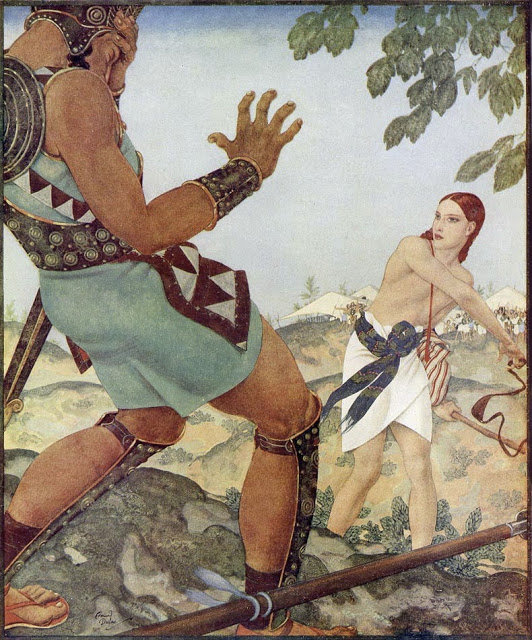Goliath is a character in the biblical Book of Samuel, described as a Philistine giant defeated by the young David in single combat. The story signified Saul’s unfitness to rule, as Saul himself should have fought for Israel. Scholars today believe that the original listed killer of Goliath was Elhanan, son of Jair, and that the authors of the Deuteronomic history changed the original text to credit the victory to the more famous character David. The phrase “David and Goliath” has taken on a more popular meaning denoting an underdog situation, a contest wherein a smaller, weaker opponent faces a much bigger, stronger adversary.
| Alias Goliath (Biblical) |
| Real Names/Alt Names Goliath |
| Characteristics Villain, Biblical Figures, Historical Figures, Literary Characters, Giant, Classical Antiquity, Middle Eastern |
| Creators/Key Contributors ○ |
| First Appearance Hebrew Bible (Tanakh) |
| First Publisher ○ |
| Appearance List Literature: Hebrew Bible (Tanakh), Quran, The King James Version of the Bible, et. al. Comics: Four Color #1205 – David and Goliath (adapting a movie with Orson Welles), Jumbo Comics #107, National Comics #19, et. al. Film: Goliath contro i giganti (Goliath Against the Giants, 1960), Goliath e la schiava ribelle (Goliath and the Rebel Slave, a.k.a. The Tyrant of Lydia vs. The Son of Hercules, 1963), Golia e il cavaliere mascherato (Goliath and the Masked Rider, a.k.a. Hercules and the Masked Rider, 1964), Golia alla conquista di Bagdad (Goliath at the Conquest of Baghdad, a.k.a. Goliath at the Conquest of Damascus, 1964), Goliath and the Vampires (1961), Goliath and the Sins of Babylon (1963), etc. |
| Sample Read The King James Version of the Bible [PG] |
| Description Goliath is a character in the biblical Book of Samuel, described as a Philistine giant defeated by the young David in single combat. The story signified Saul’s unfitness to rule, as Saul himself should have fought for Israel. Scholars today believe that the original listed killer of Goliath was Elhanan, son of Jair, and that the authors of the Deuteronomic history changed the original text to credit the victory to the more famous character David. The phrase “David and Goliath” has taken on a more popular meaning denoting an underdog situation, a contest wherein a smaller, weaker opponent faces a much bigger, stronger adversary. |
| Source Goliath – Wikipedia |


